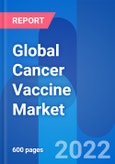Several Investigational Cancer Vaccines Have Progressed Towards Late-Stage Clinical Trials
Report Highlights:
- Global and Regional Market Size Insight 2022 Till 2028
- Cancer Vaccine Market Insight and Forecast By 10 Countries 2022 Till 2028
- Cancer Vaccine Market Insight and Forecast By 10 Different Cancers 2022 Till 2028
- Approved Cancer Vaccines Patent, Price, and Dosage Analysis
- Insight On More Than 350 Cancer Vaccines in Clinical Trials
- Cancer Vaccines Trials Insight By Company, Country, and Indication
- Insight On More Than 20 Cancer Vaccines Commercially Available In Market
The global cancer vaccine market is expected to surpass US$ 15 Billion by 2028. The significant increase in the growth of the market is mainly attributed to encouraging sales of HPV cancer vaccines and rising awareness among individuals regarding the benefits of HPV vaccination. Apart from this, several investigational cancer vaccines have progressed towards late-stage clinical trials and are expected to gain market authorization, which will also have a positive impact on the growth of market.
The use of vaccines for the prevention of infectious diseases represents one of the greatest achievements in modern medicine. Owing to their advantages, research studies have also focused to explore the potential of vaccines in the prevention or management of chronic diseases including cancer. Cancer vaccine represents a unique approach to cancer therapy that alters the interaction of the host and the tumor, enlisting the patient’s tumor response to attack cancer cells. Further, the immunologic memory associated with the administration of vaccines also gained the interest of researchers to invest in this segment.
To date, both therapeutic, as well as preventive cancer vaccines, have gained entry into the global market. Several cancer vaccines including Gardasil, Gardasil 9, Cecolin, or Cervarix have been approved to prevent HPV infection. These target high-risk HPV strains responsible for nearly all cervical cancers and are also linked to some throat, anal, and other cancers. In contrast, Provenge was the first therapeutic vaccine globally approved in 2010 for the management of prostate cancer. Apart from this, CemaVax, Riavax, and Vaxira have also been approved for the management of non-small cell lung cancer and pancreatic cancer. The entrance of vaccines has been shown to greatly transform the paradigm of cancer treatment.
Currently, the pipeline of cancer vaccines is highly crowded which are increasingly reporting encouraging success in clinical trials across a wide range of cancers. Several vaccines are also awaiting marketing approval or commercialization. For instance, US FDA is currently reviewing BLA application for N-803 plus Bacillus Calmette-Guandeacute;rin as a treatment for patients with BCG-unresponsive non-muscle invasive bladder cancer. Apart from this, Cervac has been approved in India and is expected to be available in the market soon. The presence of a wide range of clinical pipeline products indicates a strong future presence in the market.
With the continuous research and development activities in this domain, scientists have also developed other enhanced platforms for vaccine development including mRNA vaccines, personalized neoantigen cancer vaccines, stem cells, and others. Although these are present in the early stages of clinical development, they represent huge potential across a wide range of cancers. Further, the market will also experience growth with the introduction of artificial intelligence algorithms which aid in the precise detection of neoantigens and also factor in the early development of companies. Several top players in the market have utilized machine learning to develop their proprietary artificial intelligence algorithm for the characterization of neoantigens and ultimately develop personalized neoantigen cancer vaccines.
In the last few years, pharmaceutical companies have also collaborated with artificial intelligence players to develop potential cancer vaccines. For instance, in 2022, CureVac entered into a research and option agreement with myNEO which will aim to identify specific antigens found on the surface of tumors for the development of vaccines. To achieve this goal, myNEO will leverage its biological datasets and its integrated machine learning and bioinformatics platform to identify and validate specific antigen targets predicted to elicit a strong immune response. Apart from this, myNEO also collaborated with Abera Bioscience to develop personalized cancer vaccines. Other key players in the global market are Argos Therapeutics, Nykode Therapeutics, Merck, Regeneron, GlaxoSmithKline, CureVac, Dendreon, Sanofi, and OSE Immunotherapeutics.
Table of Contents
Companies Mentioned (Partial List)
A selection of companies mentioned in this report includes, but is not limited to:
- Anixa Bioscience
- Argos Therapeutics
- AstraZeneca
- BioNTech
- Bristol Myers Squibb
- Champions Oncology
- CureVac
- Elicio Therapeutics
- ETheRNA
- GlaxoSmithKline
- ImmunityBio
- Imugene
- InBio
- Mayo Clinic
- Merck
- Nykode Therapeutics
- Regeneron
- Roche
- TVAX Biomedical
- UbiVac
- Ultimovacs
- VBI vaccines








